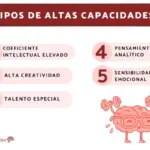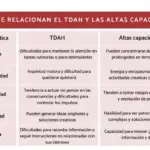
The relationship between high sensitivity and high abilities can manifest itself in various ways. Not all people who are highly sensitive also have high abilities, and vice versa. Even so, there are those who do have both high sensitivity and high abilities, which causes them to be highly emotionally sensitive and also have exceptionally high cognitive potential.
These people experience a very strong emotional and sensory intensity, as well as intellectual performance significantly above average. To understand it better, in this PsychologyFor article, we will provide you with information about What is the relationship between high sensitivity and high capabilities.
What is the relationship between high sensitivity and high abilities?
Although they are different, both high sensitivity and high capacities share certain common characteristics. We show them to you below:
- Processing depth: Both highly sensitive and highly gifted people process information more thoughtfully than most. They are more perceptive of their surroundings. For example, their senses, such as sight, smell, and hearing, are highly developed.
- Emotional sensitivity: High sensitivity is related to a strong perception of emotional and sensory stimuli from the environment. Likewise, people with high abilities may be more sensitive on an emotional level, and this may influence the way they perceive and react to the world.
- Empathy: It is a common characteristic between high sensitivity and high capacities. Individuals with one or both have a greater ability to put themselves in the shoes of others and understand their emotions.
- Speed in information processing: unlike the vast majority of people who take a certain amount of time to draw a conclusion or solve a problem, both high sensitivity and high abilities have superior mental speed. In this sense, they have the advantage of associating ideas, images and sounds in a more concrete way.
- Perfectionism: High sensitivity and high abilities are related to high personal standards. People with these characteristics are very critical of themselves and others when they do not achieve their goals.
- Recurring concerns: Beyond the logical differences between each person, the truth is that invasive and repetitive thoughts can arise that settle for a long time. In turn, these ideas are usually negative and produce worries that do not easily cease.
- Live intensely: Both highly sensitive and highly capable individuals experience emotions and thoughts intensely. They are passionate about their interests and care deeply about the world around them.
To find out if you are, in this article you will find the Characteristics of Highly Sensitive People (HSP).
How high capacities and high sensitivity are detected and measured
Detecting and measuring high abilities and high sensitivity can be a complex process, involving different objective and subjective evaluations. Here we present how to detect them:
High capacities
To detect and measure high capacities, the following tests are carried out:
- IQ Tests: IQ tests, such as the WISC (for children) or the WAIS (for adults), are tools used to assess intellectual ability.
- Specific psychological evaluations: designed to detect higher cognitive abilities in areas such as memory, verbal or non-verbal reasoning, and problem solving.
- Academic Performance Evaluations: Exceptional performance in various academic areas, such as mathematics, science, arts, or humanities, can be an indicator of high abilities in a specific field.
- Interview with family: This is a conversation between the mental health professional and the family of a person who may be diagnosed with high abilities. During the course of the interview, the intention is to find out if there is a family history that can explain a person’s intelligence.
High sensitivity
The tests necessary to detect high sensitivity are:
- Questionnaires and evaluation scales: such as the Highly Sensitive Person Scale (HSPS), to measure sensitivity in different domains, such as emotional, sensory and social sensitivity.
- Interviews and clinical evaluations: Mental health professionals conduct interviews and clinical evaluations of the person in question to identify highly sensitive traits, such as the tendency to become overstimulated and emotional intensity.
- Behavioral observations: Outside observers, such as family, friends, or professionals, can identify behavioral patterns associated with high sensitivity, such as needing time to process information, avoiding stimulating environments, and a high degree of empathy.
- psychological tests: The most used are the Weschler scale, the Raven intelligence test and the Rorschach scale. All these instruments determine the type and degree of intelligence of a human being.
It is worth mentioning that the detection and measurement of high abilities and high sensitivity can only be determined by mental health professionals who have appropriate training.

Difficulties of being highly capable PAS
Being a Highly Sensitive Person (HSP) with high abilities can be challenging. The most common difficulties that a person with these characteristics faces are:
- Risk of overstimulation: High-ability HSPs are susceptible to sensory and emotional overload, so they may feel overwhelmed in noisy environments, crowds, or emotionally draining situations.
- Short lasting social relationships: Due to the excessive worries people with this condition have, it is difficult for them to create lasting social bonds. The social, family and school environment can also be affected. On the emotional side, these conditions can cause irritability, anxiety and/or discomfort.
- Difficulties connecting with others: Although high-ability PAS people have deep empathy and emotional understanding, they can often feel misunderstood or different from their peers. You probably have different interests and concerns that take you away from the mainstream, making it difficult to connect with others.
- Difficulties finding a balance: Finding a balance between emotional sensitivity and intellectual abilities can be a challenge. Struggling to meet emotional needs while channeling your energy and talent into meaningful and stimulating activities can be complicated.
- Lack of adaptation to changes: Due to the rituals and customs that they can build over time, high-capacity PAS people can find it difficult to face the changes that occur in life. This is applicable in areas such as work, school, family, society, or the economy, among others.
This article is merely informative, at PsychologyFor we do not have the power to make a diagnosis or recommend a treatment. We invite you to go to a psychologist to treat your particular case.
If you want to read more articles similar to What is the relationship between high sensitivity and high capabilities? we recommend that you enter our Clinical Psychology category.
Bibliography
- Fernández Saiz, M. (2021). Evaluation of the relationship between Highly Sensitive People-PAS-and High Abilities-AACC (Doctoral dissertation, European University of the Atlantic).
- Luque-Parra, DJ, Luque-Rojas, MJ (2017). High intellectual abilities and attention deficit hyperactivity disorder: a case report. Educational Perspective Magazine, 56 (1), 164-182.








